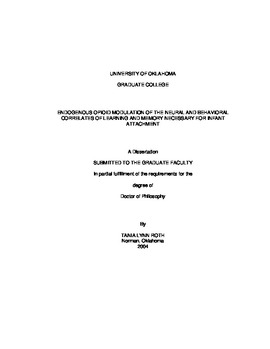| dc.description.abstract | Disorganized attachment in which a child attaches to an abusive caregiver is a significant risk factor for childhood and adult psychiatric disorders. Both animal and clinical studies suggest that disorganized attachment behaviors are often precipitated by disruptions to development of the endogenous opioid system, as occurs with prenatal opiate exposure or postnatal maltreatment. The goals of this dissertation research were to (1) contribute to the understanding of the neurocircuitry supporting attachment despite abuse, (2) to assess the role of the endogenous opioid system in this learned attachment behavior, and (3) to assess the role of opioid modulation of the attachment neurocircuitry. Experiments utilized our lab's unique model of infant caregiver abuse that capitalizes on rat pups' dependence on maternal odor learning for attachment. In the rat, infants must learn an odor preference regardless of the quality of maternal care to secure attachment, and learned odor aversions thwart attachment. Results demonstrate that endogenous opioids are necessary for the acquisition, memory consolidation, and expression of neonate odor preferences. Furthermore, opioids play a pivotal role in the memory formation of odor preferences despite abuse, as disruption to the opioid system yields odor aversions. Assessment of the attachment circuitry supporting odor---abuse conditioning suggests that cellular changes within the olfactory bulb, the anterior piriform cortex, and the lack of significant changes in the amygdala, an area intimately associated with the memory of fear and aversions in older pups and adults, contribute to readily learned odor preferences. Results also suggest that opioid modulation of the cellular activity within this attachment circuitry plays a pivotal role in securing learned odor preferences. More importantly, opioids appear to limit amygdala participation in neonate memory formation despite abuse, and disruption of opioid activity within the neonate amygdala yields odor aversions. Overall, results indicate a prominent role of the endogenous opioid system in mediating the neonate learning and memory necessary for attachment, and thus highlight how prenatal or postnatal disturbances to the developing opioid system jeopardize infant attachment. Furthermore, these results offer an avenue into understanding how these early adverse experiences affect the attachment process and subsequent emotional development. | en_US |
